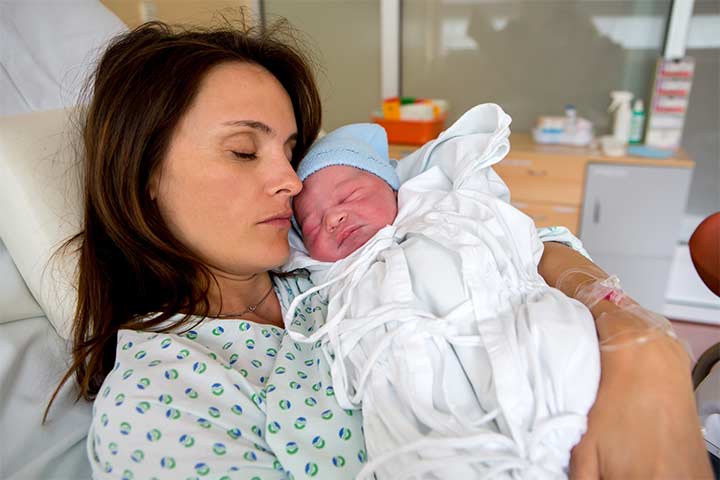
Shutterstock
You might gather a lot of information about what goes on before, during, and after childbirth so you can be well prepared for what’s in store for you. But along the way, you are bound to be surprised, no matter how much you try to know everything. You can ask your doctor everything you need to know about childbirth, and they will probably explain everything in detail. However, it might not always be fully clear – especially when it’s a medical procedure or a medicine itself. But you have every right to know, and we are here to tell you.
Most women are given a dose of Pitocin after childbirth, and here’s why. According to a report published in 2020, most maternal deaths occur within the first 24 hours after delivery, and nearly one-fourth of these deaths occur due to postpartum hemorrhage (1). Pitocin is an injection that is given to mothers soon after delivery to prevent bleeding. It’s a dose of oxytocin that stimulates the contraction of the uterus and prevents bleeding (2).
How Does It Work?
Image: Shutterstock
Oxytocin is a hormone produced in the body and is associated with childbirth, breastfeeding, and love-making. It is also linked to trust, empathy, contact with your loved ones, and the big-O (3). Oxytocin is commonly known as the love hormone and is produced naturally by the pituitary gland. Now, Pitocin is a manufactured version of oxytocin injected into mothers who’ve just given birth to help stimulate the contraction of the uterus. It is also given to pregnant women to induce labor (4).
The FDA approved it in 1980, and it has been around ever since. During pregnancy, certain blood vessels in the uterus carry blood to the placenta. After the baby’s birth, when the placenta separates from the uterus, the uterus is supposed to contract to close those blood vessels. Blood loss depends on this factor (5).
Pitocin increases the concentration of calcium inside the muscle cells that control the contraction of the uterus. An increase in calcium concentration aids in an increase in the contraction of the uterus (6).
Possible Side Effects Of Pitocin
Image: Shutterstock
While it is essential to receive a dose of Pitocin after delivery, which your doctor will administer, there are some common side effects that you should keep an eye out for. You could experience nausea, loss of appetite, redness or irritation at the injection site, stomach pain, runny nose, and cramping. You can also have more intense or frequent contractions and sinus pains (7).
However, if you experience severe symptoms like excessive bleeding, headache, hallucinations, slurred speech, and extreme weakness, inform your doctor immediately. Symptoms like loss of coordination, fast, slow or uneven heart rate, severe vomiting, seizures, or dangerously high blood pressure levels should not be ignored (8). Let your physician know, so they know how to take care of you.
What Else Should You Know?
Image: Shutterstock
Pitocin should not be administered to pregnant women unless it’s to induce labor or abortion. Once it has been given to new mothers, oxytocin can be secreted in breast milk. Therefore, mothers should refrain from nursing their babies for at least 24 hours after receiving the dosage (9). Ensure that your doctor informs you of the side effects, drug interactions, and safety precautions before you’re given the drug.
There is so much to know about pregnancy and childbirth. We learn new things about our bodies each day and how advanced the medical field has become. Sure, there might be complications, but medicine has evolved to a large extent to take care of humans in the best possible way. Were you aware of an artificial oxytocin drug? Comment below and let us know your experience of being injected with Pitocin!















